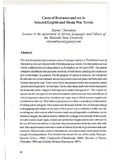Please use this identifier to cite or link to this item:
https://cris.library.msu.ac.zw//handle/11408/1519Full metadata record
| DC Field | Value | Language |
|---|---|---|
| dc.contributor.author | Charamba, Tyanai | - |
| dc.date.accessioned | 2016-06-08T07:29:23Z | - |
| dc.date.available | 2016-06-08T07:29:23Z | - |
| dc.date.issued | 2013 | - |
| dc.identifier.issn | 2308-5630 | - |
| dc.identifier.uri | http://hdl.handle.net/11408/1519 | - |
| dc.description.abstract | This article explores and evaluates cases of romance and sex in Zimbabwe’s war of liberation as they are treated in the Zimbabwean war novels. It is that particular war which yielded political independence in Zimbabwe on 18 April 1980. The article compares and debates the accounts novelists of both Shona and English expression give on the matter in question. For the purpose of clarity of analysis, the researcher divides into two those intimate sexual encounters that took place between men and women during the war. There were those encounters which the researcher terms ‘positive and progressive’ on one hand. On the other hand, there were those encounters the researcher terms ‘negative and regressive and/or etrogressive’. The researcher argues that, the two types of sex-based encounters of the war time were and still are of critical importance since they constitute one major way in which women in particular contributed in that war. That effort is pertinent since there is a tendency in Zimbabwe of \isi ting and revisiting the u'ar in season and off season with the view of either promoting or denigrating individuals on the basis of their perceived contribution in that war. By revealing one other way in which women made an unforgettable contribution in the liberation struggle, this article directly lobbies for a change in the attitude of the society towards women. In principle, women are said to have fought side by side with men in the war of liberation and yet in practice, they are not promoted at the same rate with men. Men are promoted more than women at almost all levels of government and state structures. That scenario creates a mendacious view that women were minors in the struggle for independence. Four novels were chosen for use in this study. They are: Vavariro (Choto 1989), Chakwesha (Chimhundu 1990), Harvest of Thorns (Chinodya 1989) and Echoing Silences (Kanengoni 1997). | en_US |
| dc.language.iso | en | en_US |
| dc.publisher | Africa Institute for Culture, Peace, Dialogue and Tolerance Studies | en_US |
| dc.relation.ispartofseries | Madirativhange: Journal of African Indigenous Languages and Literature;Vol. 1, No. 1 | - |
| dc.subject | English, Shona words, Romance. | en_US |
| dc.title | Cases of romance and sex in selected English and Shona war novels | en_US |
| dc.type | Article | en_US |
| item.grantfulltext | open | - |
| item.languageiso639-1 | en | - |
| item.fulltext | With Fulltext | - |
| item.openairecristype | http://purl.org/coar/resource_type/c_18cf | - |
| item.cerifentitytype | Publications | - |
| item.openairetype | Article | - |
| Appears in Collections: | Research Papers | |
Files in This Item:
| File | Description | Size | Format | |
|---|---|---|---|---|
| cases of romance and sex in selected english and shona war.pdf | Abstract | 719.95 kB | Adobe PDF |  View/Open |
Page view(s)
188
checked on Feb 11, 2026
Download(s)
36
checked on Feb 11, 2026
Google ScholarTM
Check
Items in MSUIR are protected by copyright, with all rights reserved, unless otherwise indicated.



